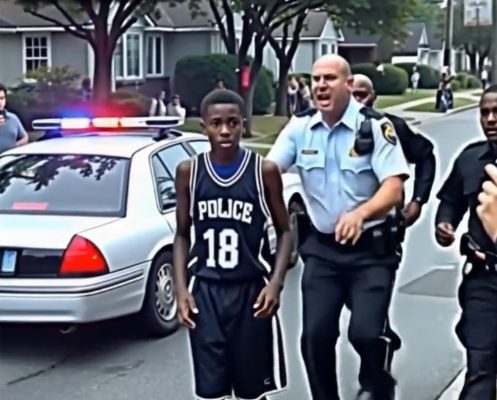Reed’s bravado crumbled as he processed the unexpected turn of events. The other officers in the precinct exchanged nervous glances, aware of the brewing storm. The presence of federal agents brought an air of authority that could not be ignored.
“Agent Carter, I—” Reed stammered, trying to regain his composure.
“Save it,” Carter interrupted. His voice was icy, and his gaze never wavered from Reed’s. “My son is not a criminal, and I want him released immediately. I will not tolerate this abuse of power.”
Reluctantly, Reed nodded to one of his colleagues to remove Jamal from the holding cell. Jamal emerged, his face bruised and his spirit shaken, but his relief was palpable. He went straight to his father, who wrapped him in a protective embrace.
Agent Carter turned to the precinct’s captain, a stern woman who had just arrived to assess the situation. “Captain, I expect a full investigation into Officer Reed’s conduct. This behavior is unacceptable and will not go unchecked.”
The captain nodded, understanding the gravity of the situation. “We will launch an internal review right away, Agent Carter. I assure you, this matter will be taken seriously.”
As the Carters prepared to leave, the mood in the station was tense. Reed stood silently, a mix of shame and anger on his face. He knew the incident would have repercussions not only for him but also for the department that had overlooked his behavior for too long.
Outside, the evening air was a welcome change from the oppressive atmosphere inside the precinct. Jamal and his father walked towards the waiting SUVs. Jamal, still shaken, looked up at his father, gratitude and admiration in his eyes.
“Thanks, Dad,” Jamal said quietly.
Agent Carter gave a reassuring nod. “We’ll get through this, son. What happened today was wrong, and we’re going to make sure it doesn’t happen again.”
The drive home was somber but filled with a sense of resolve. Jamal’s ordeal had highlighted a systemic issue that needed addressing. As much as this was a personal victory for Jamal, it was also a call to action against a broader problem that affected countless others.
In the following days, the investigation into Officer Reed’s actions gained momentum, fueled by the public outrage sparked by the videos of Jamal’s arrest that circulated online. Community leaders rallied together, demanding justice and reform. The Atlanta Police Department faced intense scrutiny, forced to confront the racial biases that had long been ignored.
Jamal, supported by his family and community, found himself at the center of a movement for change. His story resonated beyond his immediate circle, becoming a symbol of resilience and the fight against injustice.
As he stepped back into his routine, Jamal knew his life had irrevocably changed. But with his father by his side and a community behind him, he felt empowered to use his voice and experience to advocate for others. The incident that had begun with an act of racial profiling had transformed into a powerful catalyst for change, illuminating the path towards a more just and equitable society.



